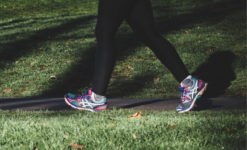Ask Mr. Pedometer and Friends how to “Boost Your Brain” to reduce the risk of dementia
July 17, 2019
Q: Mr. Pedometer, all of us deal with physical challenges as we age. The one that terrifies me is the possibility of disappearing into dementia. Are there any ways to “Boost Your Brain” to cut the risk of Dementia?”
A: I hear you. Some researchers predict that as many as 13 percent of us will develop Alzheimer’s. However, that need not be inevitable, even if some in your family history have suffered from dementia.
Good news coming from the recent Alzheimer’s Association International Conference in Los Angeles earlier this month is that choosing a healthy lifestyle can reduce your risk of dementia and Alzheimer’s. According to Dr. Gayatri Devi, a neurologist who specializes in Alzheimer’s disease, “Regardless of how much genetic risk someone had, a good diet, adequate exercise, limiting alcohol, and not smoking made dementia less likely.”
This conclusion was based on studying nearly 200,000 people in England. Head researcher was Dr. Elzbieta Kuzma at the University of Exeter Medical School in England. The study focused on people age 60 or older of European ancestry, so “it’s not known whether the same is true for other racial or ethnic groups.”
An article entitled “Boost Your Brain,” by Paula Spencer Scott, appeared in the July 14 edition of “Parade,” in the Sunday newspapers. The subtitle was, “It’s never too early – or too late! – to whip your brain into shape and fight cognitive decline.”
Here are some of the tips she shared to “Boost Your Brain” and reduce the risk of dementia:
-
DRINK MORE WATER – “The brain is 80 percent water, “says neuroscientist Lisa Mosconi, Ph.D.,
 author of Brain Food. Even mild dehydration can affect brain function.
author of Brain Food. Even mild dehydration can affect brain function. -
GET YOUR HEART THUMPING – “Even a 10-minute walk or bike ride changes how parts of the brain connect and perform.”
-
FEED YOUR HEAD – Eat more plant foods and fewer processed foods. “To reduce inflammation, eat within a 12-hour window, says Michael Crupain, M.D., co-author of What to Eat When.”
-
MIND YOUR BLOOD PRESSURE – “In a 2018 trial, keeping systolic pressure under 120 best protected the brain.”
-
SEEK HELP FOR SLEEP PROBLEMS – “If you’re not falling asleep fast, getting seven to eight hours, and rising refreshed, there may be an issue, like sleep apnea (now strongly linked with dementia), you need to address.
Most of these are simple things we can do to live a healthy lifestyle and reduce the risk of dementia. The benefits are worth it.
These articles give even more credence to my usual sign-off: